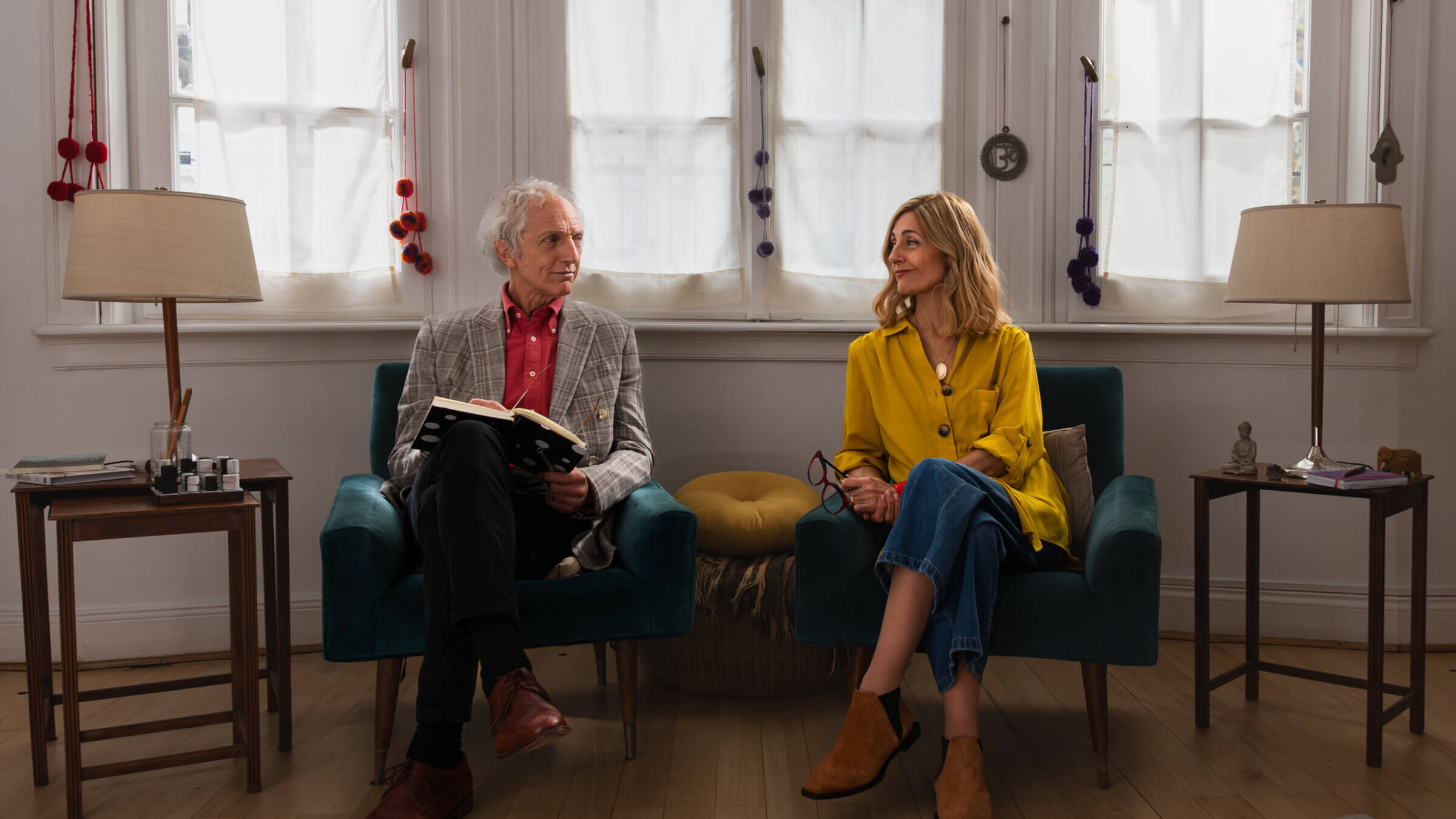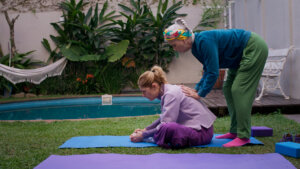In this Jewish family, everybody needs therapy — especially the therapists themselves
The Argentinean series ‘Family Therapy’ features a pair or married therapists, who face emotional challenges of their own

In ‘Family Therapy,’ Carola Reyna and Boy Olmi play psychotherapists married to each other. Courtesy of ChaiFlicks
An entertaining, off-the-beaten track Argentinian series, Family Therapy delicately straddles the line between the credible and improbable, between realism and satire. It is at times endearing, at other times mercilessly comic in its critiques, and at still other times, it manages to combine both qualities simultaneously. Still, on the most fundamental level, as each episode ended I wanted to know what happened next?
Directed by Alejandra Ciancio, the eight-parter focuses its very contemporary lens on modern family dynamics and psycho-therapeutic techniques among the comfortable classes in metropolitan Argentina.
The two leads, Susi (Carola Reyna) and Jose (Boy Olmi) are psychotherapists, married to each other, who enjoy a successful joint practice as co-therapists. Their specialty is dysfunctional couple relationships which often merge with their own issues.
Their family includes Abel, a social-media addicted, affable but unambitious teenage son in trouble at his posh school for bullying and misogynistic behavior. There’s the couple’s 35-year-old lesbian daughter Mara and her partner Vera, both of whom are determined to have a child, and have settled on Mara’s old friend Darius to serve as the sperm donor. And then there’s Susi’s mom, Bobe, a slyly intelligent yenta who sports heavy blue eye shadow and a wild red wig and knows what’s best for everyone.
When Susi’s father abruptly dies, her life is turned upside-down and for reasons that are never made entirely clear she decides to leave her husband and forge her own path. Despite the inevitable turmoil the marital break-up creates, Susi and Jose are determined to continue their collaborative work as co-therapists. Reyna and Olmi, stars in Argentina, are in fact married in real life. Perhaps that off-screen bond enhances their terrific chemistry on screen.
Though the show’s co-creator and show-runner, Ariana Saiegh, is Jewish, the family’s Jewishness is incidental. A substantial Jewish population exists in Argentina and they are, according to many accounts, an assimilated subculture. In this series references to the family’s ethnic identity occur sporadically. Most pointedly at the funeral service held for Susi’s father where it becomes clear that the family’s Jewishness is nominal at best. Susi is unfamiliar with the ritualized renting of the cloth at the grave site and balks at the prospect of ruining her expensive new sweater.
As it’s presented here psychotherapy is ubiquitous in Argentina. References to Sigmund Freud and Jacques Lacan are sprinkled throughout, although the particular technique employed by our protagonists is a trendy hodgepodge of alternative therapies. Its hallmark is a series of physical exercises. which includes forehead tapping and rant-and-rave sessions.
In one particularly amusing, preposterous, episode a young couple who has not had sex for years is encouraged to stand, face each other, and rotate their pelvises in figure eights while proclaiming various events identified with intimate sexual activity. Susi joins them and the trio perform a hip swiveling choreography. Everyone is aroused, though for much of the time, Jose tries to arrange his face to suggest thoughtful respect.

To a North American, at least this one, psychotherapy as one of life’s centerpieces feels a bit dated. By contrast, the show’s aspirational elements are spot-on current. Indeed, the therapists’ light, airy, spacious home with its high end, understated furnishings, is right out of an HGTV program. I especially love the sophisticated decorative art that underscores the owners’ aesthetic and philosophical viewpoints along with their educational backgrounds and economic status.
The mantle displays tiny ebony animal sculptures that are at once primitive and abstract. The painting above the mantle features an open empty suitcase on an otherwise blank canvas, which evokes both Marcel Duchamp’s suitcase paintings and René Magritte’s iconic “This Is Not a Pipe.” What fitting art for psycho-therapists who on principle take nothing at face value. Kudos to set designer Damian Silva Fernandez.
After the marital breakup, both Susi and Jose land new partners quickly. Their romances are hot and heavy. And within short order they’re all part of the perfect “blended” family. When Susi meets Jose’s emotionally overwrought new girlfriend she is thrilled for him. Now she really feels free to be with her new love, the bestselling author-psychotherapist, Mario Contreras who is part con artist and always looks like he needs a shave.
Still, it’s not all smooth sailing. Jose, who never finished his graduate degree, is back in school, but his professor is also his new love. Mario views Susi as a short-term sexual playmate and a stepping stone for his own career. And Darius, the sperm donor, wants a role in the baby’s life. Vera wonders where all of this leaves her. Observing the dynamics at play, Jose quips, “It’s a new paradigm.”
The writing by Saiegh and her co-creator Gonzalo Arias is clever, Ciancio’s direction subtle, and Juan D’Eramo’s cheery theme song strikes just the right lighthearted chord.
The acting is uniformly terrific. Reyna nails the charming, earnest, and committed psychotherapist wholly unaware of her own absurdity, and Olm is convincing as an intelligent and simpatico figure trying to navigate a world he doesn’t fully understand. Nora Carpena as Bobe is delightful too as the wacky and wise matriarch. But my hands down favorite is Martin Seefeld who plays Susi’s wonderfully sleazy new lover.
The ending is predictable enough and has its share of sentiment coupled with farcical twists and turns. No spoiler alert necessary, though. It’s clear from the outset Susi and Jose will be reunited, but in a nod to feminist sensibilities Susi is off by herself to Stockholm to speak at an international psycho-therapeutic conference about her practice. Depending on your point of view, the series closes on a note of female empowerment and/or a celebration of psycho-speak nonsense. It’s the perfect coda for Family Therapy.
‘Family Therapy’ may be viewed on ChaiFlicks.















